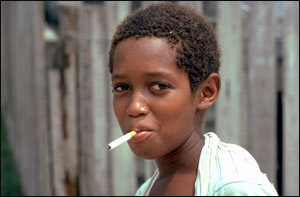A report released recently by the Africa Tobacco Control Alliance (ATCA) shows a tactic tobacco companies in Africa use in addicting kids. The report investigates developments in Nigeria, Republic of Benin, Burkina Faso, Cameroon and Uganda

An Africa regional survey conducted by the African Tobacco Control Alliance (ATCA) reveals that multinational tobacco manufacturing companies are systematically targeting children as young as six years old to pick up the habit of smoking cigarettes.
The survey exposes the aggressive marketing tactics of tobacco companies, such as British American Tobacco (BAT) and Philip Morris International (PMI), who display cigarettes next to sweets and snack at kiosks directly outside the gates of primary and secondary schools.
At the launch of the survey findings at a press conference in Johannesburg on Wednesday December 7, 2016 Mr. Deowan Mohee, the ATCA Executive Secretary, exposed the tobacco companies’ tactics by providing evidence based on research and monitoring in five countries in Africa.
“The evidence is clear. British American Tobacco, Philip Morris International, and other tobacco companies deliberately and systematically target African children near their schools in order to encourage cigarette smoking among them,” he said.
The survey was conducted in 2016 in a radius of 100 meters around 79 schools in five African countries.
“The survey findings lay bare the egregious tactics used by tobacco companies to market their deadly products to young school children, making them accessible and affordable,” Mr. Leonce Sessou, ATCA Communications Manager, added.
The survey indicates that the tobacco industry makes extensive use of advertising and promotion to encourage school children to experiment with tobacco, increase consumption and normalise the habit. In Burkina Faso, 100% of the schools surveyed are surrounded by stores that advertise cigarettes openly.
Apart from advertisements, tobacco companies also promote the sale of single sticks and child-friendly flavoured cigarettes to lure the children to the cheap and sweet-tasting products. According to the ATCA survey, these marketing activities of the tobacco companies are being carried out in violation of existing national laws in countries like Nigeria and Uganda. In both countries, despite the prohibition on tobacco advertising and promotion, BAT continues with the practice around schools.
“Tobacco Use in Africa: Tobacco Control through Prevention”, a 2013 report from the American Cancer Society, indicates that African children smoke at comparable levels, and sometimes even higher than other developing regions of the world. While not clear, this can be attributed to the aggressive marketing tactics from the tobacco companies.
ATCA and its partners have therefore called out to African governments across the continent to enact and vigilantly enforce laws that are compliant to the World Health Organisation Framework Convention on Tobacco Control.
“If unchecked, the aggressive marketing strategy of tobacco companies towards children will contribute to a major epidemic of tobacco use in Africa, causing unprecedented health, economic, social and environmental consequences,” Mr. Mohee stresses.
Speaking on the report, Deputy Executive Director of Environmental Rights Action/Friends of the Earth Nigeria (ERA/FoEN), Akinbode Oluwafemi, said: “The ATCA report has again exposed the length the tobacco companies will go to addict our kids. Governments across Africa must put in place and implement effective measures to stop this unwholesome practice which is targeted at the lungs of our kids.”
Oluwafemi added that recommendations in the ATCA report, particularly the ban on single sticks and small packs sale, and total prohibition of tobacco advertising promotion and sponsorship (TAPS) near schools, should be taken with more seriousness and enforced by African governments.
